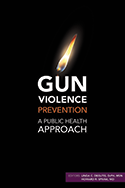Aging, Health and Equity
 “People are growing older and experiencing a much longer life span than that of prior generations. Many people over the age of 60 are healthier today and living in place within their home-based communities with noninstitutionalized care…To date, there has been precious little attention to how we discuss and frame aging through a public health lens.”
“People are growing older and experiencing a much longer life span than that of prior generations. Many people over the age of 60 are healthier today and living in place within their home-based communities with noninstitutionalized care…To date, there has been precious little attention to how we discuss and frame aging through a public health lens.”
-- Elaine Jurkowski and Aaron Guest, "Healthy Aging Through the Social Determinants of Health," APHA Press, 2021
In 2034, the United States will have more adults age 65 and older than children. Historical gains in life expectancy are thanks in part to advances in medicine and public health and improvements in many social determinants of health. But these benefits have not been evenly distributed. Deeply rooted health inequities exist among subpopulations of older adults.
In particular, Black, Hispanic and American Indian/Alaska Native people have shorter life expectancies and poorer health status, as do other demographic groups, including populations with lower educational attainment and those who have experienced poverty.
Learn. Connect. Be inspired.
APHA Now is the Association's digital library of events, CE offerings and more. APHA members receive a discount on all courses and events.

What can we do?
- Address ageism. During the COVID-19 pandemic, the impacts of ageism in health care, public health, long-term care services and supports, employment and housing have contributed to high death and illness rates among older adults.
- Follow recommendations included in such guidance as the World Health Organization's healthy aging framework, the National Academy of Medicine's Vital Directions for Health and Health Care 2021 series and guidance from the U.S. Preventative Services Task Force and The Community Preventive Services Task Force.
- Acknowledge ableism and its impact on an aging population. Two in five older adults live with a disability.
- Pay attention to the intersection of racism and ableism.
7 Ways to Help Maintain Your Brain Health
Studies show that healthy behaviors, which can prevent some kinds of cancer, type 2 diabetes, and heart disease may also reduce your risk for cognitive decline. Although age, genetics, and family history can’t be changed, the Lancet Commission on dementia prevention, intervention, and care suggests that addressing risk factors may prevent or delay up to 40% of dementia cases.
Here’s what you can do:
 Quit smoking. Quitting smoking now may help maintain brain health and can reduce your risk of heart disease, cancer, lung disease, and other smoking-related illnesses. Free quitline: 1-800-QUIT-NOW (1-800-784-8669).
Quit smoking. Quitting smoking now may help maintain brain health and can reduce your risk of heart disease, cancer, lung disease, and other smoking-related illnesses. Free quitline: 1-800-QUIT-NOW (1-800-784-8669).- Maintain a healthy blood pressure level. Tens of millions of American adults have high blood pressure, and many do not have it under control. Learn the facts.
- Be physically active. CDC studies show physical activity can improve thinking, reduce risk of depression and anxiety and help you sleep better. Here are tips to help you get started.
- Maintain a healthy weight. Healthy weight isn’t about short-term dietary changes. Instead, it’s about a lifestyle that includes healthy eating and regular physical activity.
- Get enough sleep. A third of American adults report that they usually get less sleep than the recommended amount. How much sleep do you need? It depends on your age.
- Stay engaged. There are many ways for older adults to get involved in their community.
- Manage blood sugar. Learn how to manage your blood sugar especially if you have diabetes.
APHA Resources
Healthy Aging Through the Social Determinants of Health (APHA Press)
Aging and Public Health Section
For media interviews with experts on this topic, contact APHA Media Relations. To connect with APHA members working in the field of aging and health equity, contact the APHA Aging and Public Health Section chair.
APHA Policy Statements (find more in the APHA Policy Statement Database)
- Building Environments and a Public Health Workforce to Support Physical Activity Among Older Adults
- Improving Health and Wellness through Access to Nature
- Strengthening the Dementia Care Workforce: A Public Health Priority
- Supporting and Sustaining the Home Care Workforce to Meet the Growing Need for Long-Term Care
- Supporting Public Health's Role in Addressing Unmet Needs in Serious Illness and at the End of Life
Additional Frameworks for Public Health Action
Actualizing Better Health and Health Care for Older Adults (National Academy of Medicine)
Age-Friendly Ecosystems: global movement to advance how community systems enable older adults to thrive. Within the U.S., these networks include:
- AARP Network of Age-Friendly States and Communities
- Age-Friendly Health Systems (Institute for Healthcare Improvement)
- Age-Friendly Public Health Systems (Trust for America's Health)
- Age-Friendly Universities (Academy for Gerontology in Higher Education)
Aging (National Academy of Medicine)
World Health Organization
- Disability and Health
- International Classification of Functioning, Disability and Health
- Decade of Healthy Ageing: Baseline Report, 2021
More Resources
Government resources
Healthy Aging, Centers for Disease Control and Prevention
Aging, National Institutes of Health, National Institute on Aging
Minority aging, Resource Centers for Minority Aging Research, National Institutes on Aging
Administration for Community Living
Other professional organizations and societies
